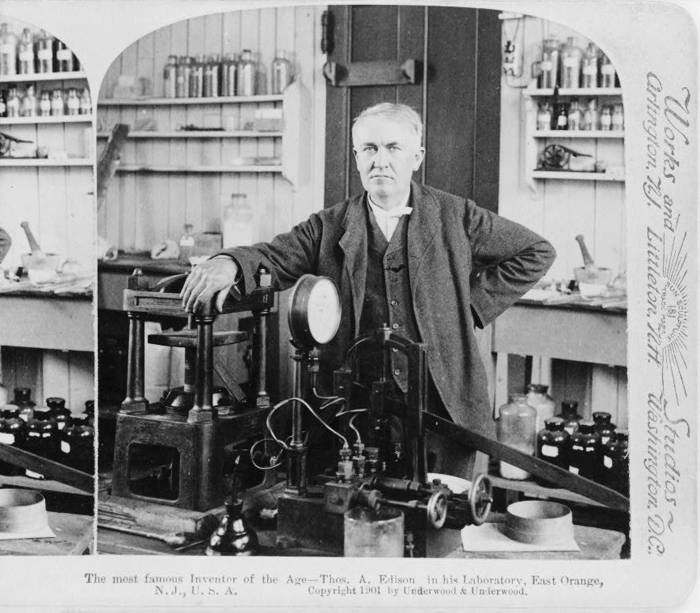

Witness, for instance, the recent Third Annual Radio World’s Fair, in New York, where the attendance for the week was 228,000, the greatest on record of any radio show, and a tremendous increase over last year’s figures. Rather than waning in popularity, it is well known that radio is on the constant increase. They are not given with any idea of starting a controversy. Edison’s remarks, the statements that follow are facts which can be checked up by any one who is unbiased. Radio, therefore, owes a tremendous debt to Thomas Alva Edison and I recommend to the radio industry that it acknowledge this debt more frequently in the future. It is the Edison Effect that has made possible our present vacuum tubes, now used universally in radio. Edison and the “Edison Effect,” radio would not be what it is today. Edison that the radio industry so far has been unwilling to accord him. Right here I wish to pay a tribute to Mr. It would be well-nigh impossible for him to be in touch with all of the various commercial phases of radio all over the country and like other executives he obtains his reports from subordinates, and such reports often as not may be highly colorful and even wrong. Edison is a busy man, and a tremendously busy inventor. Edison has not been recently in touch with radio sufficiently to appreciate fully the tremendous advances that have been made. Edison to wish to say anything of a controversial nature, or anything that would even border on discourtesy to the great inventor, but I do believe that Mr. I have too high a personal opinion of Thomas A. The following comments of mine, most of which were printed in the New York Times of September 26, and the New York Evening Post of the same date, were made by me at the time, and are here somewhat amplified: Edison, the press, and particularly the radio press over the entire country, has been more or less agitated. Since the publication of this famous interview with Mr. Edison’s latest invention, his 40-minute phonograph record-a great achievement, and one that without doubt will be of much benefit to the phonograph industry. Incidentally, this outburst from the dean of modern electricity was in connection with the announcement of Mr. That is why the phonograph is reclaiming its own.” It was a big and interesting thing and the people responded to it, but they want good music and they have found it is not to be had on the radio.

Edison chuckled in his characteristic manner, “Static is awful, and the difficulties of tuning out-and now they are stealing each other’s wavelengths! It is too bad that the radio has to be so complicated.

Turning to the musical side of the question, Mr. It is not a commercially successful machine, because it is too complicated.” They are giving it up as fast as they can. The business becomes unprofitable for the dealer to engage in. A farmer five miles from town buys a radio, perhaps on the installment plan. In towns where 25 or 30 dealers were handling radio sets, only one or two are now handling them. The fact is that radio has never had a high peak of popularity. The phonograph is coming into its own because the people want good music. Of course most of them don’t know that the soprano voice distorts the radio. “Thousands of people have signed a petition asking that sopranos be kept off the air. Reports from 4,000 Edison dealers who have handled radio sets show that they are rapidly abandoning it, and as for its music-it is awful,” comments the wizard of Menlo Park. It is not a commercial machine because it is too complicated. No dealers have made any money out of it. Radio is a highly complicated machine in the hands of people who know nothing about it. of the interest in radio that there was last year. Radio is impractical commercially and esthetically distorted, and is losing its grip rapidly in the market and in the home.

Edison: “The radio is a commercial failure, and its popularity with the public is waning. The following remarks on the subject are attributed to Mr. Edison has recently been quoted in the press as saying that Radio is a dismal failure. Edison’s claim that radio is a failure yet it is pointed out that the Radio Industry owes Edison a great debt wherein facts and figures are given to show that Radio is on a steady increase granting that neither Radio nor the phonograph is yet perfect how the interest in Radio is steadily increasing, and radio dealers are now making good money.


 0 kommentar(er)
0 kommentar(er)
